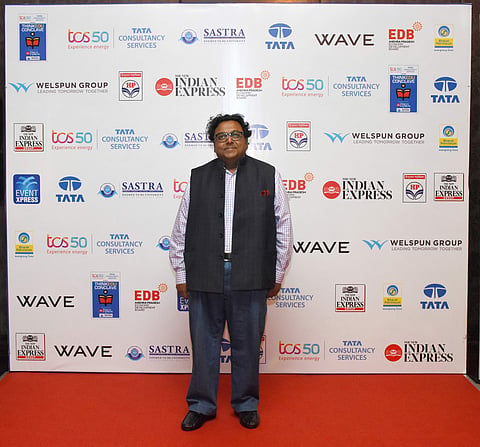

Ashwin Sanghi started his career as a businessman, and yet, his flair for writing made him the famous author that he is today. Until 2002, he was a full-time businessman, but a visit to the Rozabal Shrine in Srinagar changed the course of his life. This shrine, which was rumoured to be the resting place of Jesus Christ, fascinated Sanghi to no end, so much so that he researched about it for over two years. Eventually, he wrote The Rozabal Line. He says that it was completely accidental how he entered the world of writing. Thank God for that, we think! Excerpts from the interview:
You are a businessman and an acclaimed author. How do you strike a balance between business and pleasure?
Ten years ago, I was a businessman who was also an author and now, I am an author who is also a businessman. The proportion of the time that I gave for writing has today made me much more of a writer than a businessman. In that sense, my priorities over ten years have undergone a transformation.
Are there any lessons from Ancient India that we haven't learnt correctly?
With any ancient work, there is bound to be both good and bad lessons that can be drawn from it. The question is how much of it do you wish to pick up and what do you want to pick up. For example, if there is a wonderful story about the victory of Pandavas, then there is also the greed and lust of the Kauravas. If you look at a text like the Arthashastra and read some of Kautilya's views on women, you will realise that they are patriarchal and misogynistic. Today, when I look at the present society, nothing much has changed. We are still living in a patriarchal world. It is a problem for me personally and I don’t like the fact that we have held on to this part of what Kautilya wrote about. Similarly, if we look at other aspects of Arthashastra, it says that the duty of the king should be Dharma, that is to uphold righteousness and duty. Doing this will lead to Artha, which means gaining wealth and power. But wealth and power were not seen as the ultimate objective. These two factors were seen as a means to attaining Raksha, which means defence and Yogakshema, which means the welfare of people. In other words, there was a broader nobility of purpose to what Kautilya was saying. Today, what we see is Chanakya Neeti. The greater purpose to perform your Dharma, build Arth and use it for the greater good, this objective is lost.
You have been switching between writing mythological books and the 13 Step series which are self-help books. How difficult is it to switch?
It’s not really difficult because ultimately when we are writing these books, it's storytelling — just different kinds. When I am writing books in the Bharat series, the focus is to entertain the readers and give them information which was not known before. I consider this to be the point of education. Finally, when the reader reaches the end of the book, he or she might have had an 'A-ha!' moment where they wonder why they have not thought of the subject before. I consider this to be a moment of enlightenment. So it educates, entertains and enlightens. However, that’s not the case with crime thrillers like Private India and Private Delhi which I have co-authored with James Patterson. It’s purely for entertainment and there is no factor of education or enlightenment.
With the 13 Step series, I try to entertain readers so that they know more about a particular subject. I am not trying to enlighten, but only educate readers through it so that they understand the subject through the simple terms used.
How do you choose the subject of the books? Are these lessons learnt from your own experience or is this what youngsters want to read?
The subject is picked by co-authors because the books in the 13 Step series are co-authored, except the first book titled 13 Steps to Bloody Good Luck. The remaining books come from vertical domain knowledge of a co-author. I can’t be an expert in so many subjects like wealth, health or parenting. Eventually, the co-author has domain expertise, does research and puts together the initial draft and I bring storytelling into the picture. I convert what would otherwise be rather boring material to an interesting story.
Any reason behind the usage of the words ‘Bloody Good’?
Not really. I had written an original story which was rejected by many when I was trying to get it published. A family friend suggested that I stop worrying because it’s 99 per cent about good luck. When I asked him about that remaining one per cent he said that it is, ‘Bloody good luck’, effectively telling me that 100 per cent of what happens in life is dictated by good luck. So that is what led to the first book 13 Steps to Bloody Good Luck. Having used '13 steps' and 'bloody good' as a part of the title, we decided that it would make sense to use that for all the subsequent books.
What other books can we expect from this series?
Currently, the next book in this series is 13 Steps to Bloody Good Sales, one on Communication and for upcoming writers, we will be releasing a book titled 13 Steps to Bloody Good Writing. There will be a lot of books coming up in this series. Our intention is to put out about three to four titles every year.
